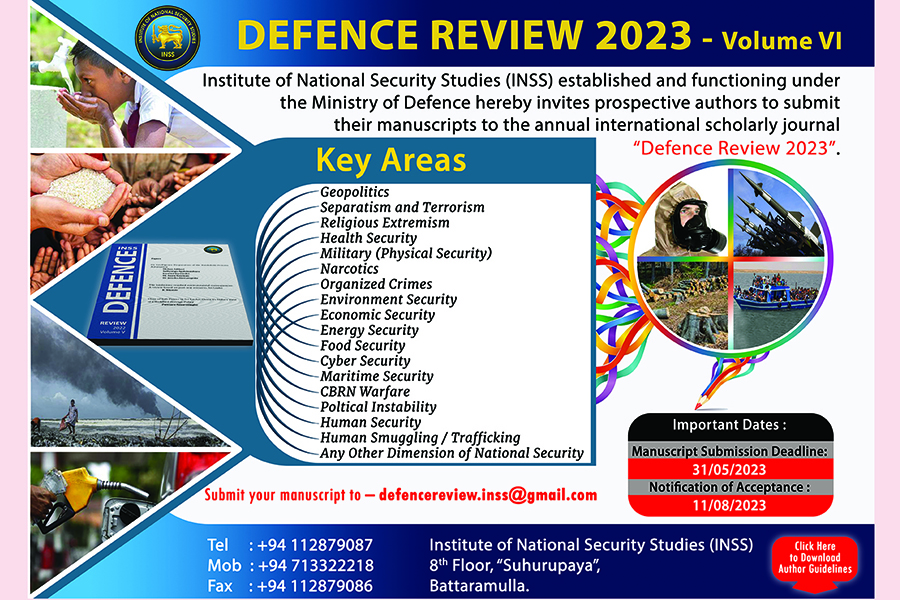INSS invites essays for ‘Defence Review 2023’
April 03, 2023
GUIDELINES FOR AUTHORS
1. Articles must relate to National Security and we welcome scholars who explore debates in the areas of Geopolitics, Separatism and Terrorism, Religious Extremism, Military (Physical) security, Maritime security, Narcotics and organized crime, cyber security, Environment, Economic and Energy security, Health, Food and Human security with regional and global comparisons.
2. Research articles must have a word count between 4000-7000 words, including all references, appendices, tables and figures. Submissions that exceed this limit will not be accepted for review.
3. Tables and figures are encouraged in articles and must be placed within the text. Each table, figure or map must have a concise and clear title in bold Italic and should be numbered using Arab numericals.
4. The title should be specific to the study yet concise and should be comprehensible to readers outside your field.
5. Font of the paper should be Times New Roman. The main title in 16pt font and the subtitles in 14pt. Single spacing with 1.5 margin to be followed. The body of the paper should be in 12pt and the foot notes in 10pt font in Calibri (body).
6. Plagiarism is literary theft of someone else’s work, words or ideas from printed or online sources. Directly quoted information as well as information that is paraphrased or summarized must be credited to the sources from which it was obtained. Plagiarism can be deliberate or accidental, so avoid being penalized by learning how to properly cite and reference sources. Manuscripts should conform to 17th edition of Chicago manual of style guide for both referencing and style.
7. A publishable paper (manuscript) should contain the following;
- a. Abstract
- b. At least 4 key words
- c. Introduction (what is the problem or need)
- d. Purpose and research question/s to be explored
- e. Analysis/results & discussion of research and how results impact theory and practice
- f. Conclusion
- g. Recommendations
- h. Bibliography & references.
8. Abstract and complete article (manuscript) must be submitted together by the author to the institute at the specific deadline given.
9. An abstract is an outline /brief summary of your paper and your whole project. It is a well- developed paragraph , should be exact in wording and must be understandable by a wide
audience. It should highlight major points of your research and explain why your work is important, what your purpose was, how you went about your project , what you learned and what you concluded. Ideally, it should be divided in to four sections as follows.
a. Title
b. Background – Describe clearly the rationale for the study being done. End with a specific study hypothesis and / or study objectives.
c. Methods and Findings – Describe what was studied (be as specific as possible including numbers studied). Describe the study design/intervention/main methods used/what was primarily being assessed and if appropriate , over what period.
d. Conclusion – Provide a general interpretation of the results with any important recommendations for future research.
10. An abstract should be no more than 250 words, formatted in Microsoft word, and single spaced, using size 12 Times New Roman font.
11. You need to have at least four key words in alphabetical order placed at the end of the abstract so that the paper can be categorized and searched, allowing readers to locate it and decide if they want to read the longer work.
12. The result of the double-blind peer review process is binding for the author of the contribution, who should incorporate the comments from reviewers and revise the manuscript by the deadline specified by the secretary of the Editorial Board.
13. When the manuscript is revised according to peer review recommendations the author should include a letter to the editor noting the changes made or provide an explanation refuting the reviewer’s comments and recommendations .
14. It is in the interest of the author to provide maximum assistance by communicating in a timely manner with the Secretary of the Editorial Board and respecting the deadlines established.
15. Manuscripts submitted must maintain a high quality of scholarship, must not plagiarize the work of others, must be original and unpublished nor submitted for review /publication elsewhere and must contribute to the field of National security.
16. Failure to follow the above guidelines will result in the article being rejected.